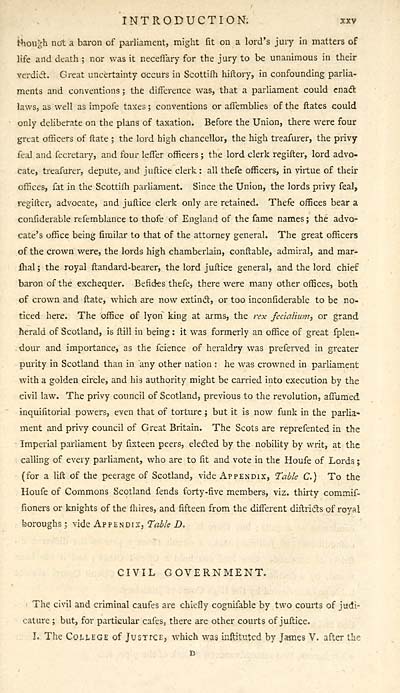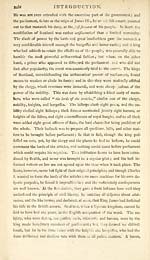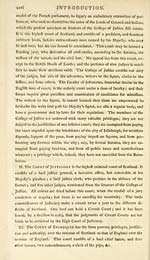Gazetteer of Scotland
(33) Page xxv
Download files
Complete book:
Individual page:
Thumbnail gallery: Grid view | List view

INTRODUCTION. xxv
Wtou£h not a baron of parliament, might fit on a lord's jury in matters of
life and death ; nor was it necefiary for the jury to be unanimous in their
verdict. Great uncertainty occurs in Scottifh hiftory, in confounding parlia-
ments and conventions ; the difference was, that a parliament could enact
laws, as well as impofe taxes ; conventions or aflemblies of the ftates could
only deliberate on the plans of taxation. Before the Union, there were four
great officers of ftate ; the lord high chancellor, the high treafurer, the privy
feal and fecretary, and four lefTer officers ; the lord clerk regifter, lord advo-
cate, treafurer, depute, and juftice clerk: all thefe Officers, in virtue of their
offices, fat in the Scottifh parliament. Since the Union, the lords privy feal,
regifter, advocate, and juftice clerk only are retained. Thefe offices bear a
confiderable refemblance to thofe of England of the fame names ; the advo-
cate's office being fimilar to that of the attorney general. The great officers
of the crown were, the lords high chamberlain, conftable, admiral, and mar-
Ihal ; the royal ftandard-bearer, the lord juftice general, and the lord chief
baron of the exchequer. Befides thefe, there were many other offices, both
of crown and ftate, which are now extinct, or too inconfiderable to be no-
ticed here. The office of lyoh king at arms, the rex fecialium, or grand
herald of Scotland, is ftill in being : it was formerly an office of great fplen-
. dour and importance, as the fcience of heraldry was preferved in greater
purity in Scotland than in any other nation : he was crowned in parliament
\vith a golden circle, and his authority might be carried into execution by the
civil law. The privy council of Scotland, previous to the revolution, afiumed
inquifitorial powers, even that of torture ; but it is now funk in the parlia-
ment and privy council of Great Britain. The Scots are reprefented in the
Imperial parliament by fixteen peers, elected by the nobility by writ, at the
calling of every parliament, who are to fit and vote in the Houfe of Lords ;
(for a lift of the peerage of Scotland, vide Appendix, Table C.) To the
Houfe of Commons Scotland fends forty-five members, viz. thirty commif-
fioners or knights of the fhires, and fifteen from the different diftricts of royal
boroughs ; vide Appendix, Table D,
CIVIL GOVERNMENT.
The civil and criminal caufes are chiefly cogniiable by two courts of judi-
cature ; but, for particular cafes, there are other courts of juftice.
I. The College of JusxrcE, which was instituted by James V. after the
D
Wtou£h not a baron of parliament, might fit on a lord's jury in matters of
life and death ; nor was it necefiary for the jury to be unanimous in their
verdict. Great uncertainty occurs in Scottifh hiftory, in confounding parlia-
ments and conventions ; the difference was, that a parliament could enact
laws, as well as impofe taxes ; conventions or aflemblies of the ftates could
only deliberate on the plans of taxation. Before the Union, there were four
great officers of ftate ; the lord high chancellor, the high treafurer, the privy
feal and fecretary, and four lefTer officers ; the lord clerk regifter, lord advo-
cate, treafurer, depute, and juftice clerk: all thefe Officers, in virtue of their
offices, fat in the Scottifh parliament. Since the Union, the lords privy feal,
regifter, advocate, and juftice clerk only are retained. Thefe offices bear a
confiderable refemblance to thofe of England of the fame names ; the advo-
cate's office being fimilar to that of the attorney general. The great officers
of the crown were, the lords high chamberlain, conftable, admiral, and mar-
Ihal ; the royal ftandard-bearer, the lord juftice general, and the lord chief
baron of the exchequer. Befides thefe, there were many other offices, both
of crown and ftate, which are now extinct, or too inconfiderable to be no-
ticed here. The office of lyoh king at arms, the rex fecialium, or grand
herald of Scotland, is ftill in being : it was formerly an office of great fplen-
. dour and importance, as the fcience of heraldry was preferved in greater
purity in Scotland than in any other nation : he was crowned in parliament
\vith a golden circle, and his authority might be carried into execution by the
civil law. The privy council of Scotland, previous to the revolution, afiumed
inquifitorial powers, even that of torture ; but it is now funk in the parlia-
ment and privy council of Great Britain. The Scots are reprefented in the
Imperial parliament by fixteen peers, elected by the nobility by writ, at the
calling of every parliament, who are to fit and vote in the Houfe of Lords ;
(for a lift of the peerage of Scotland, vide Appendix, Table C.) To the
Houfe of Commons Scotland fends forty-five members, viz. thirty commif-
fioners or knights of the fhires, and fifteen from the different diftricts of royal
boroughs ; vide Appendix, Table D,
CIVIL GOVERNMENT.
The civil and criminal caufes are chiefly cogniiable by two courts of judi-
cature ; but, for particular cafes, there are other courts of juftice.
I. The College of JusxrcE, which was instituted by James V. after the
D
Set display mode to: Large image | Transcription
Images and transcriptions on this page, including medium image downloads, may be used under the Creative Commons Attribution 4.0 International Licence unless otherwise stated. ![]()
| Gazetteers of Scotland, 1803-1901 > Gazetteer of Scotland > (33) Page xxv |
|---|
| Permanent URL | https://digital.nls.uk/97343824 |
|---|

